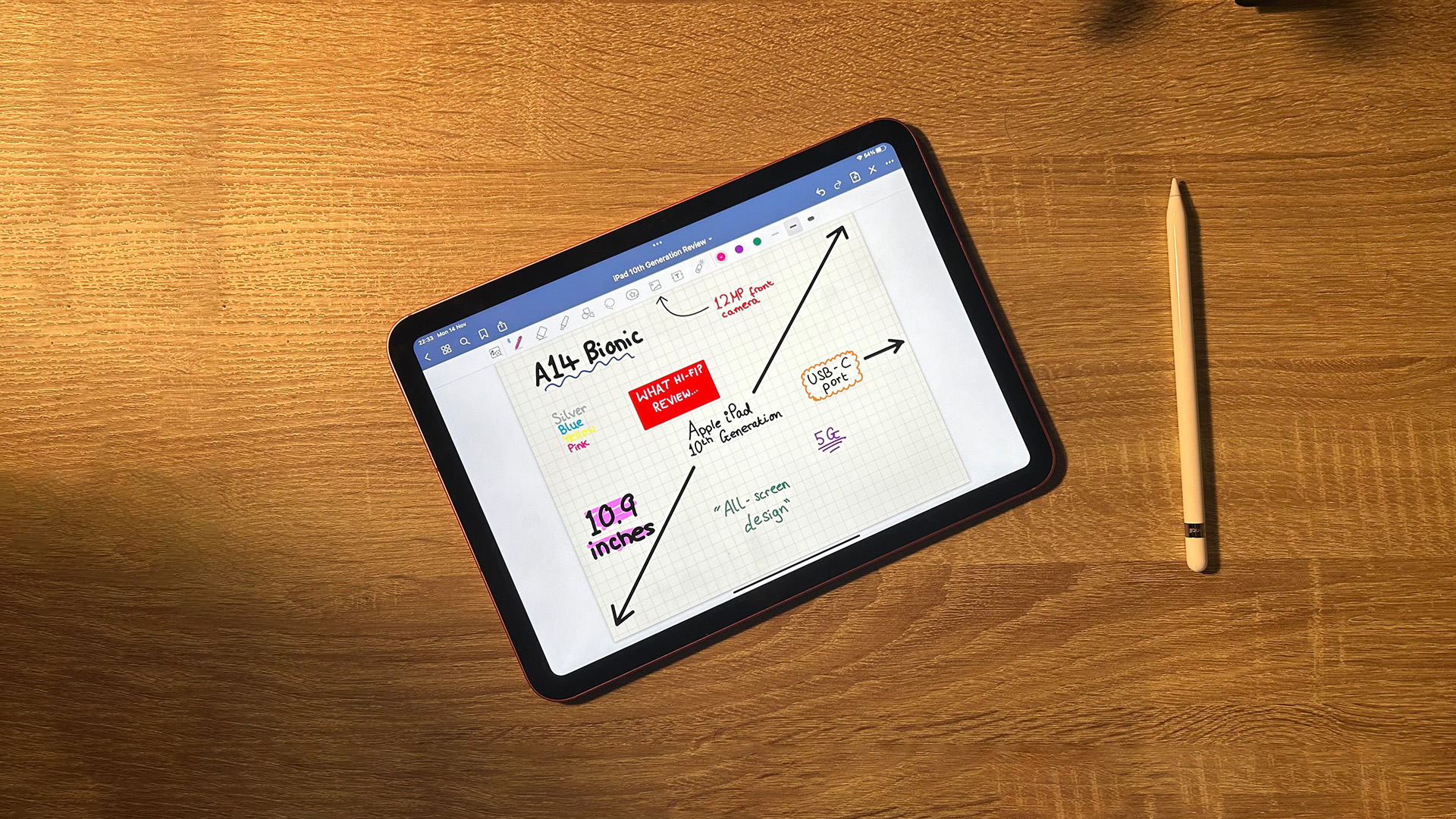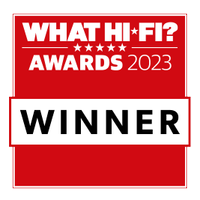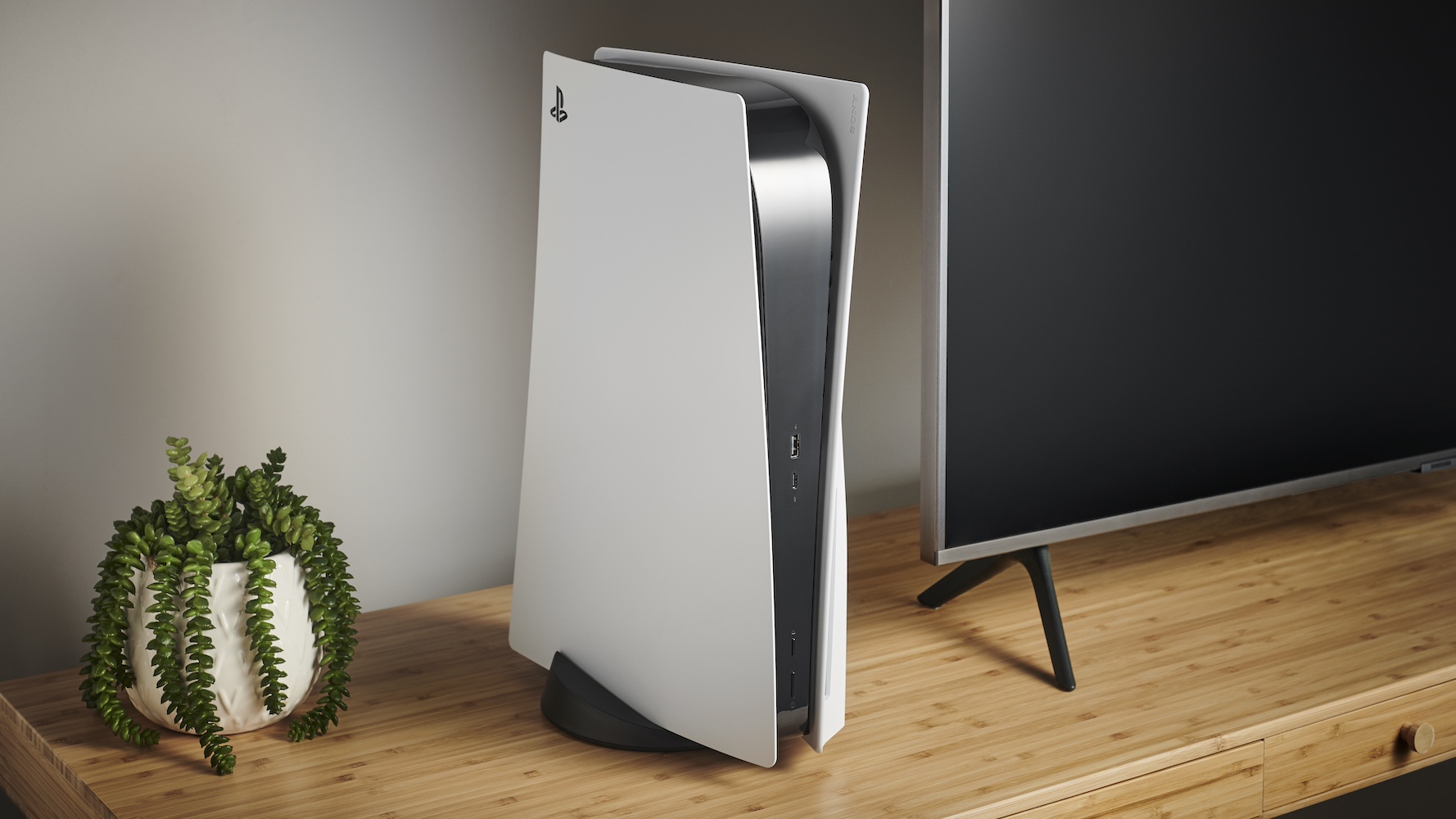What Hi-Fi? Verdict
The iPad 10th Generation packs small yet meaningful upgrades into a modernised chassis, coming together to create a well-rounded and versatile tablet
Pros
- +
Sharp and detailed display
- +
Excellent sound
- +
Lovely design
Cons
- -
More expensive than predecessor
- -
No 3.5mm headphone socket
- -
No HDR
Why you can trust What Hi-Fi?
The iPad has officially hit double digits with its latest iteration. First introduced back in 2010, this iteration marks the biggest change the standard iPad has undergone yet. This is most evident in the design, this 10th-generation tablet having shed its monochromatic shell in favour of bright hues and squared-off edges.
So has Apple brought its darling first tablet into the modern age? Or are we witnessing an iPad identity crisis?
Price
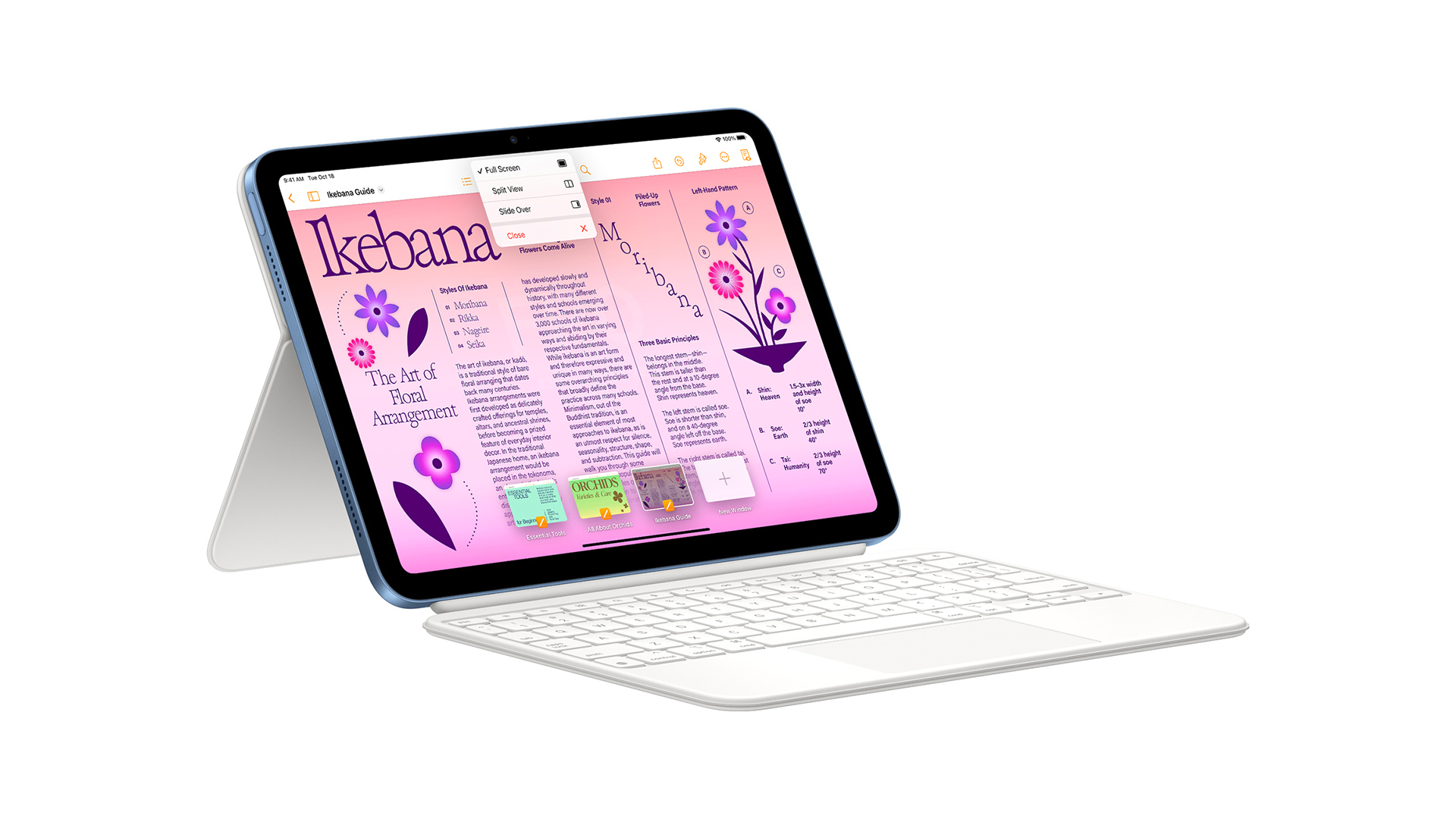
Apple’s cheapest iPad is tenuously hanging onto that designation as it joins the growing list of Apple products to receive a price increase. The 10th Generation iPad starts at £499 / $449 / AU$749 for a disappointingly stingy 64GB storage configuration with wi-fi-only connectivity.
This means that the new, baseline iPad is £130 / $120 / AU$200 more expensive than the previous generation iPad. Ouch. However, that's not the end of the story, as much like the iPhone 14, the previous generation is sticking around as a cheaper alternative to the new device.
Other iPads are still more expensive, with the Mini, Air and Pro all boasting more premium price points, so it's a double-edged sword. The iPad 10th Generation is still the cheaper option, especially if you want the modern design and features we’ll touch upon shortly, but the price hike is a tough pill to swallow.
For the bulkier chunk of change required to pick up this pad, you do get some beefier internals, including a processor upgrade to Apple’s A14 Bionic. This is the same chip found in the iPhone 12 series, and it remains blisteringly fast despite being a couple of years old. Other upgrades include 5G support on the cellular model and a camera megapixel boost from 8MP to 12MP.
Build
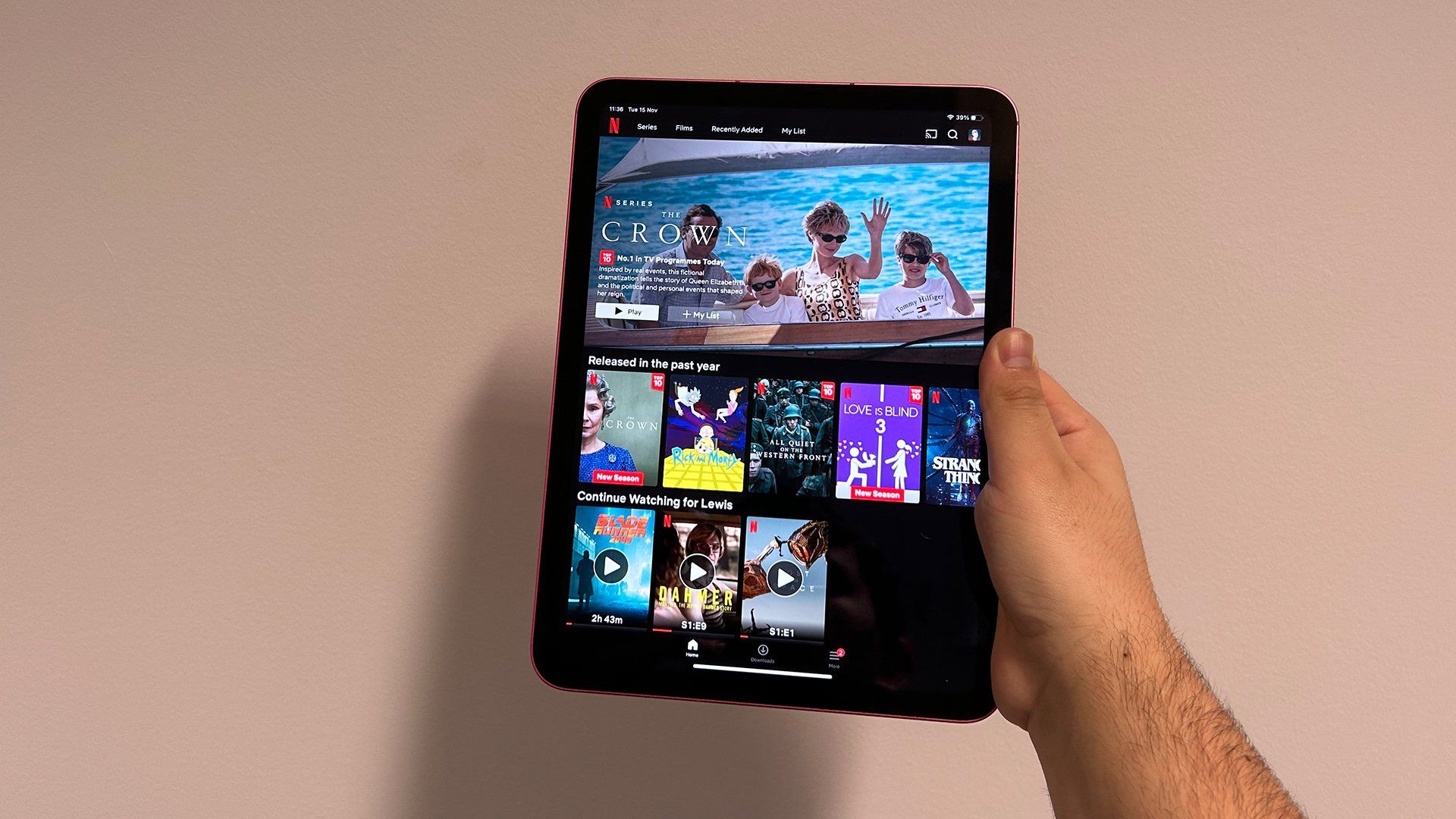
Here’s the most substantial aspect of the 10th Generation iPad’s existence: this model is the first major design overhaul we’ve seen since practically the first generation iPad. Sure, there have been variations with slicker and lighter chassis, but the traditional rounded slab with chunky bezels flanking the screen and housing the spherical home button has been the dependable iPad style we’ve come to know and get slightly bored of.
Not anymore, as the iPad has now been thrust into the modern age, bringing it in line with its sibling devices. The basic iPad is now uncannily similar to the more expensive iPad Air, with its smoothed-off flat edges and narrow bezels for what Apple calls an “all-screen” design. The 10th Gen also follows suit by ditching the Space Grey of bygone years for Silver, Yellow, Blue and Pink hues. Our Pink review model is outrageously bold in the best way, and the pop of colour really brings some fun to the iPad’s design.
Another big design upgrade to the iPad comes in the form of a screen size boost. The iPad has gone from 10.2 inches to 10.9 inches – certainly not an earth-shattering improvement, but paired with the slicker design it feels like a bigger improvement than it looks on paper. The iPad’s new dimensions are 25 x 18 x 0.7cm (height x width x depth), and it's 10 grams lighter than its predecessor at 477g.
One aspect of the 10th Gen’s design is actually an exclusive new feature that outdoes its more expensive brethren. The front-facing camera has been repositioned to the left-hand side, putting it in optimal positioning when the tablet is held in landscape orientation. It's a small change, but an appreciated (and overdue) one when we use it for video calls.
Features
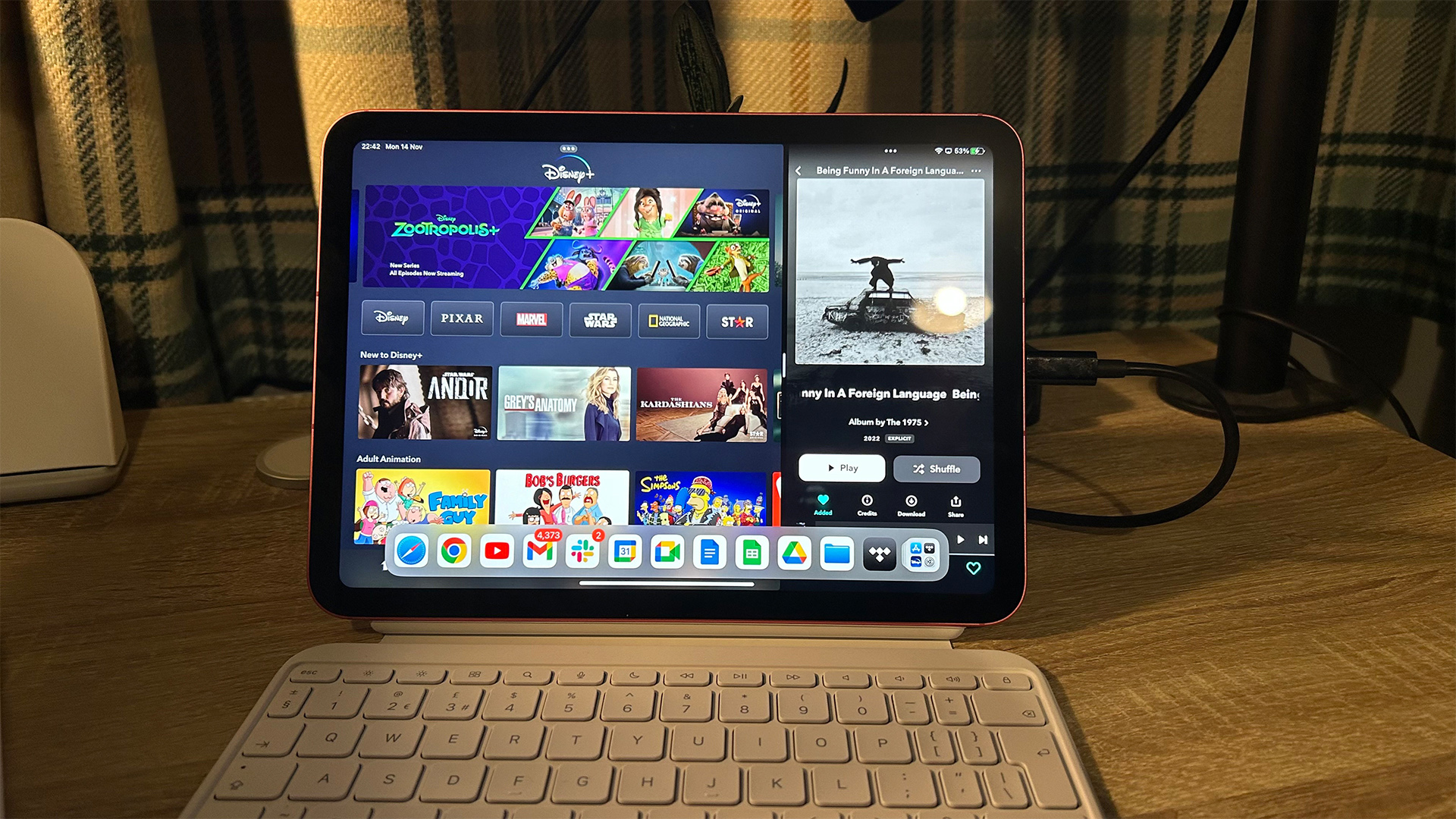
The 10th Generation iPad finally adopts USB-C for charging and data transfer. Productivity fans rejoice as this means that the entire iPad line-up (apart from the last generation iPad) has ditched Apple’s proprietary Lightning port. This opens up a world of possibilities for connecting external storage devices and accessories, opening up the iPad as a platform.
The only annoyance with the switch to USB-C is Apple’s decision to only support the first-generation version of the Apple Pencil, which charges via Lightning. That means that digital artists who want this cheaper iPad will be condemned to a life of adapter-based misery. The second-generation Pencil charges magnetically on the other flat-sided iPads, so we are left befuddled as to why Apple hasn't taken the seemingly obvious opportunity to ditch the old stylus.
Luckily, Apple’s other headline accessory makes a lot more sense. The Magic Keyboard Folio is an optional extra, but it's a stylish and quality feeling case, kickstand and detachable keyboard combo that even includes a laptop-style trackpad. It feels great to type and work on, but at the eye-watering price of £279 / $249 / AU$489, you have to be seriously dedicated to making this iPad your primary productivity machine to justify it.
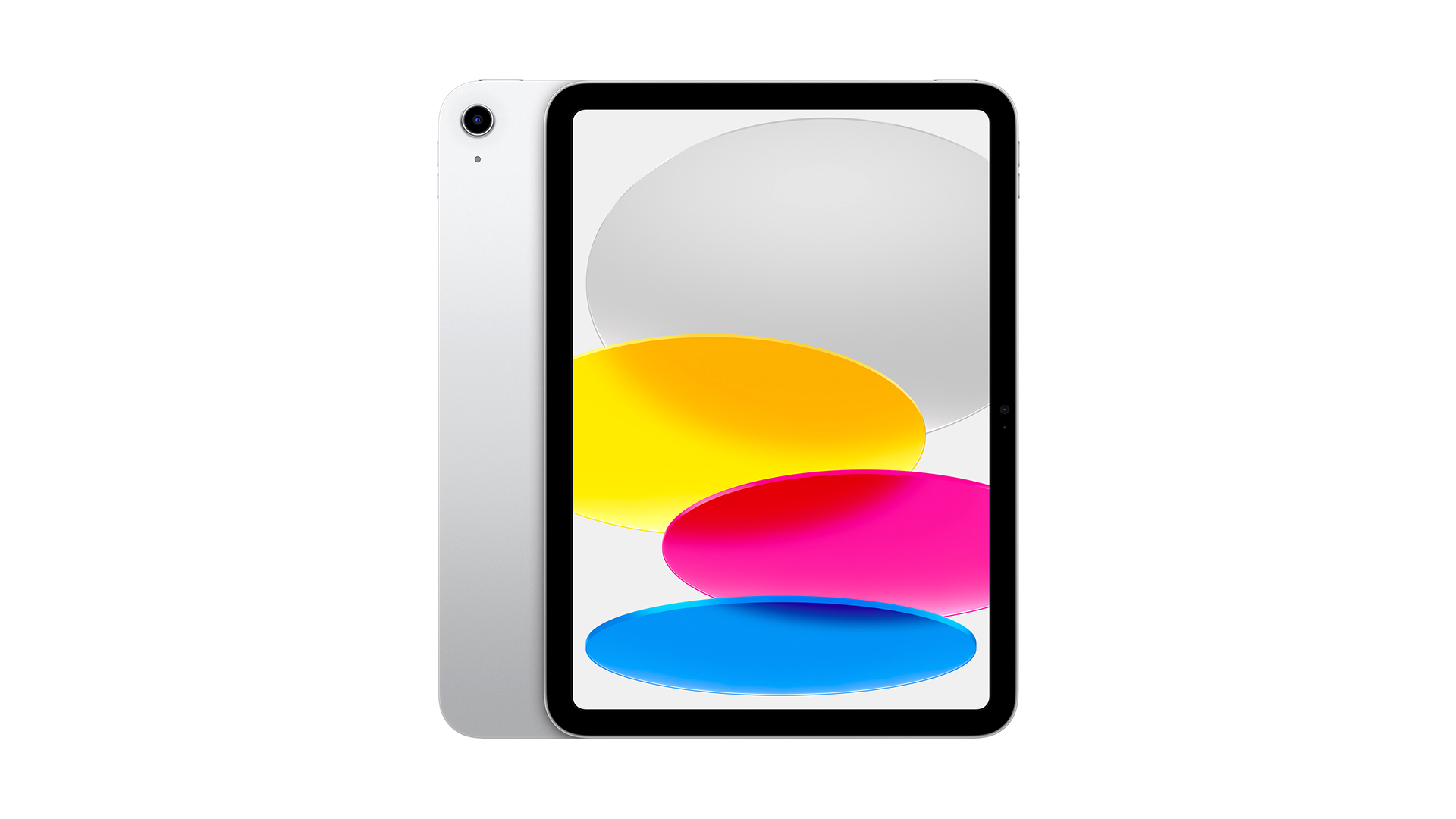
Display 10.9-inch LED Retina Display
Resolution 2360 x 1640
OS iPadOS 16
Storage 64GB, 256GB
Connections USB-C x 1
Finishes x4 (Silver, Blue, Pink, Yellow)
Of course, we're most interested in video and sound performance, so let’s dig into that larger screen. While the display gets a size bump, it also has a slight resolution increase to match. The new 2360 x 1640 resolution means that pixel density is unchanged, at 264ppi. The display technology is the same on paper, too, featuring an IPS-type LCD panel with an LED backlight and claimed peak brightness of 500 nits. It’s a shame that Apple hasn’t seen fit to increase the display’s sharpness or brightness along with its size, but it isn’t surprising – every model in the current range bar the Mini has a 264ppi pixel density, and even the current Air is capped at 500 nits.
The new 10.9-inch iPad is alone among the latest iPads, though, in having an un-laminated screen, which means there's a small gap between the glass and the digitiser; although this isn’t a major turn-off for the device, it does result in a hollow-sounding and feeling tap when interacting with the display.
Picture
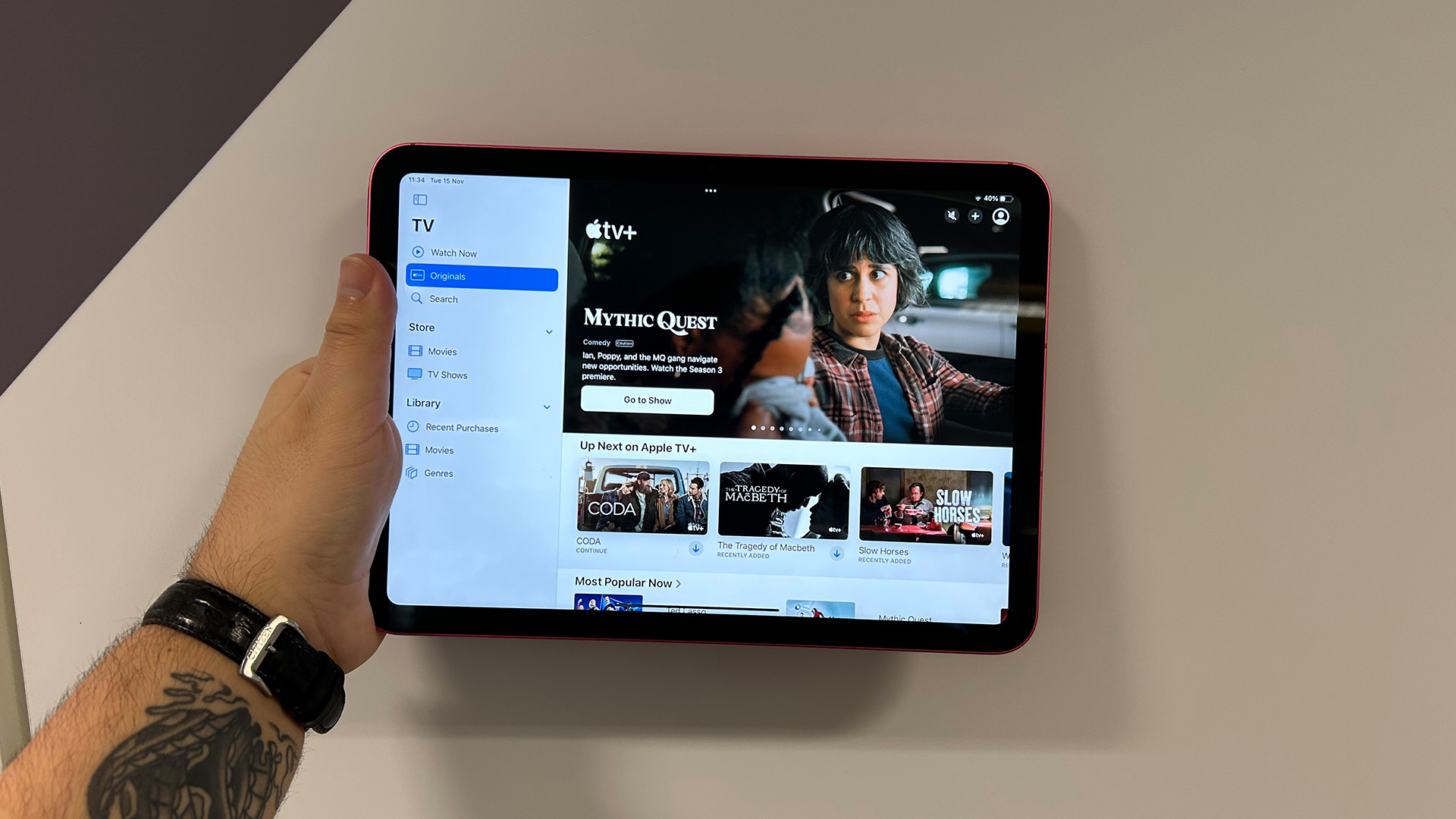
As mentioned, the new iPad's screen specifications are practically identical to those of the previous model, despite the 0.7-inch size increase, but there is slightly more to it than that.
Our old reliable Blade Runner 2049 test offers great insight into the capabilities of this tablet. The murky and violent opening shines on this screen, with sharp edges and impressive detail in both the brighter outside scenes and the dingier interior shots. Areas of Sapper Morton’s dimly lit farmhouse retain some texture despite being cast entirely in shadow, and even with the almost solid wall of fog outside the minimal windows, there’s still some detail that can be picked out.
It's actually in the colours that we notice the biggest difference from last year's model. The orange glow from the doorway is much richer and bolder on the 10th-gen model than the 9th, bringing a warm glow to the image that immediately draws the eye. Skin tones, too, are slightly punchier, but there’s no sacrifice to authenticity. Instead, it simply ekes out a little more vividness where appropriate without harming the overall balance.
The new iPad handles blacks better than its predecessor, too. Deeper and darker, they give more defined outlines to objects, highlighting the already slightly more pronounced details.
While each of these upgrades is slight in isolation, they combine to create a noticeably better picture, improving on what we already considered a five-star image in last year’s model.
Sound
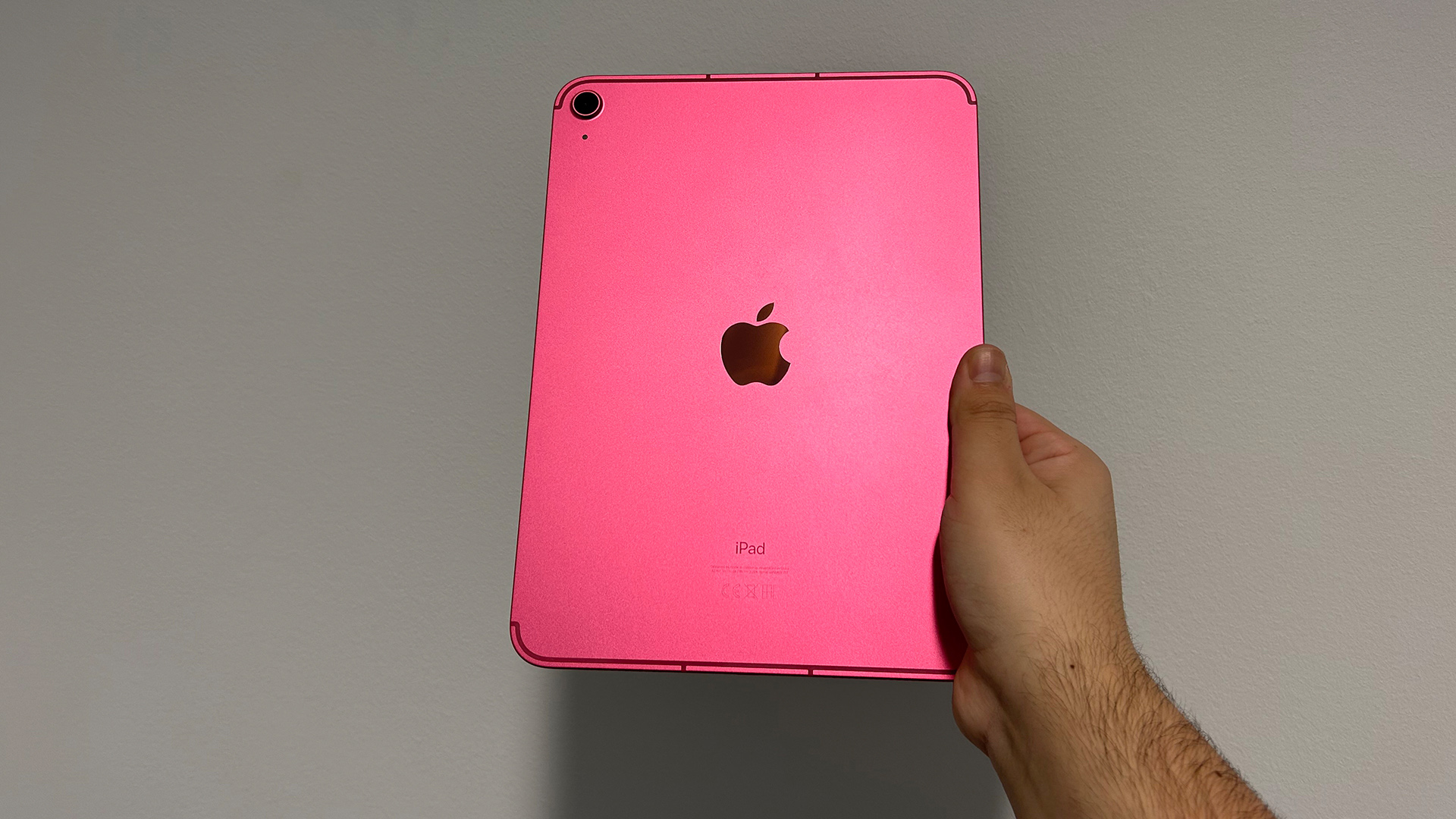
Starting with speaker sound, here is where we see the biggest improvement since last year’s model. Thanks to Apple splitting up the pair of speakers and relocating one to the other edge of the device, we can now enjoy a much better-defined and better-separated stereo sound.
Put simply, the iPad sounds better than ever when listening via the built-in speakers. Vocal performances are clear, there's enough weight for convincing bass, and the sound is much more balanced and spacious overall. While a decent wireless speaker will of course sound better, the iPad's speakers won’t have you dreading the tinny audio you often suffer on mobile devices when your headphones aren’t in reach.
Speaking of headphones, the upgrade when listening through cans is more modest. Unfortunately, the headphone socket has been culled on this new iPad, leaving just the USB-C port for wired audio, and Bluetooth for wireless.
Going via the wireless route with the Mark Levinson No.5909, we find that the subtle background ambience in Exile by Taylor Swift and Bon Iver is more clearly expressed on this newer model. These small details add extra depth to the track and round out an already impressive display of dynamics and timing. Much like the picture, headphone performance is subtly upgraded, but once you notice the slightly bolder and more detailed aspects, it becomes apparent that the 10th Gen is a refined upgrade.
Verdict
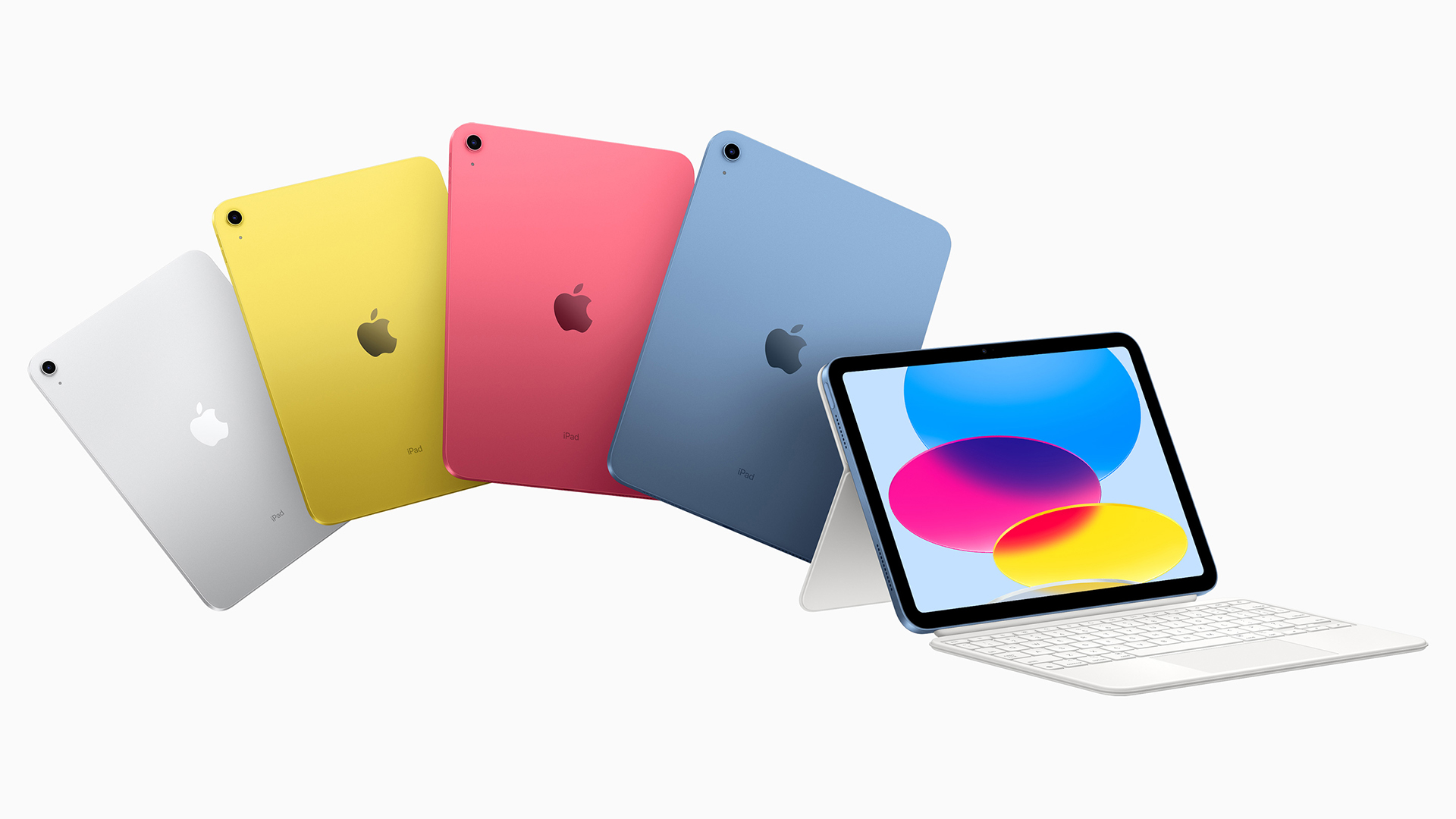
In some ways, the iPad 10th Generation feels like a major overhaul, and in others, it feels like a simple refinement. The new design certainly makes this feel like a generational shift as we wave goodbye to the home button and Lightning connector; however, the minor (yet still appreciated) upgrades to picture and sound aren’t indicative of a next-generation product.
We commended the iPad that came before it thanks to its already winning performance, commenting that a design update was overdue. Now with an even better AV experience packed into a slick new design, the standard iPad has its time to shine again and is easier than ever to recommend – if you can stretch to its elevated price tag.
- Picture 5
- Sound 5
- Features 5
MORE:
Read our review of the iPad 9th Generation
Also consider the Amazon Fire 7
Read our review of the Award winning Apple Air 5th gen
Our pick of the best tablets for movies and music
What Hi-Fi?, founded in 1976, is the world's leading independent guide to buying and owning hi-fi and home entertainment products. Our comprehensive tests help you buy the very best for your money, with our advice sections giving you step-by-step information on how to get even more from your music and movies. Everything is tested by our dedicated team of in-house reviewers in our custom-built test rooms in London, Reading and Bath. Our coveted five-star rating and Awards are recognised all over the world as the ultimate seal of approval, so you can buy with absolute confidence.
-
Hifiman ‘This means that the new, baseline iPad is £130 / $120 / AU$200 more expensive than the previous generation iPad. Ouch.’Reply
Actually, it is worse than that. The 9th generation model increased in price from £319 to £369 when this 10th generation model was announced (yes, the old model now costs more than it did when it was the new model). So there is really a £180 rise, or 56%. Crikey.
